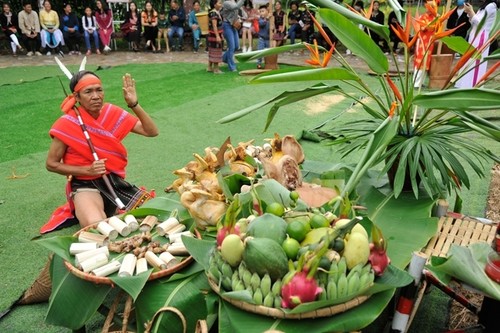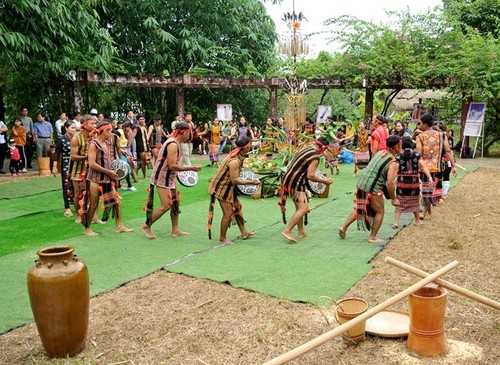 A X’tieng shaman performs the rain praying ritual. (Photo: dangcongsan.vn) A X’tieng shaman performs the rain praying ritual. (Photo: dangcongsan.vn) |
In late March X’tieng villages start preparing for the rain praying ceremony, one of their most important festivals of the year. The ceremony is held at the beginning of a new crop to thank the gods of heaven, earth, and rice for delivering the rain needed to grow rice.
“Some years we hold two rain praying ceremonies, if all the villagers agree. Following the ceremony we sow grains of rice,” patriarch Dieu Be of Binh Minh commune said.
Although the ceremony takes place in a single day, preparations often take a month. They clear the roads, decorate the ceremonial site, and prepare costumes and offerings. They use the best sticky rice to make steamed rice in bamboo tubes, pork, chicken, and other foods to offer the gods.
Dieu Sroi, an influencer in the X’tieng community of Bùu Dang district, said the offerings are all locally produced, including pork, chicken, fruit, and flowers. “We also invite some guests.”
 X’tieng men play gongs to invite the gods to the rain praying ceremony. (Photo: dangcongsan.vn) X’tieng men play gongs to invite the gods to the rain praying ceremony. (Photo: dangcongsan.vn) |
Before the ceremony, the women prepare a jar of liquor, some water, some sticky rice, and bamboo tubes to steam the rice in. If it has been a difficult year due to epidemic or crop failures, the offerings may be less than in previous years. The people just want to show the gods their sincerity.
“The offerings depend on the current circumstances. But they must include a pig's head and may also include a chicken and some fruit,” patriarch Dieu Be said.
After preparing the offerings, the villagers erect the Neu bamboo tree. The X’tieng believe that the Neu tree is a bridge connecting humans and the gods, the earth and heaven. Through the bamboo tree, the shaman conveys people’s wishes to the gods quickly, accurately, and most respectfully. The Neu tree is also a place where the gods reside on the ceremonial day.
Dieu Sroi eexplained that at the foot of the tree, they place a small table and arrange offerings on it.
“The Neu tree connects with the gods. The decorative flowers on the Neu tree represent the gods. The normal Neu tree has two parts, and the Neu for the rain ceremony has three parts.”
The ceremony begins in the morning. Young men play gongs to invite the gods to attend the ritual. The patriarch, on behalf of the villagers, sends their prayers to the gods. He wears traditional clothes – a short-sleeved brocade shirt and a loincloth – and holds a sickle.
When the ceremony time arrives, he walks closer to the front of the tree, his hands raised high, eyes facing the tree, and begins chanting the prayer to the gods:
“The gods of heaven, earth, rain, and rice, the dry season has lasted for a long time. In the fields the plants and trees are dry, the birds are silent, the forest trees are withered, people are thirsty, and a new crop is coming. Today is a good day. We have erected a Neu tree and prepared chickens and pigs to worship the gods. First of all, we thank you for protecting and blessing everyone and giving us good health to work, and enough food and clothing. We beg you to bless us with rain for the animals and plants to grow, for a good harvest, and for happy people.”
After the parchiarch recites the prayer, the women splash water on the Neu tree, and into the sky, and on all the people to pray for freshness and coolness and for all things to grow well.